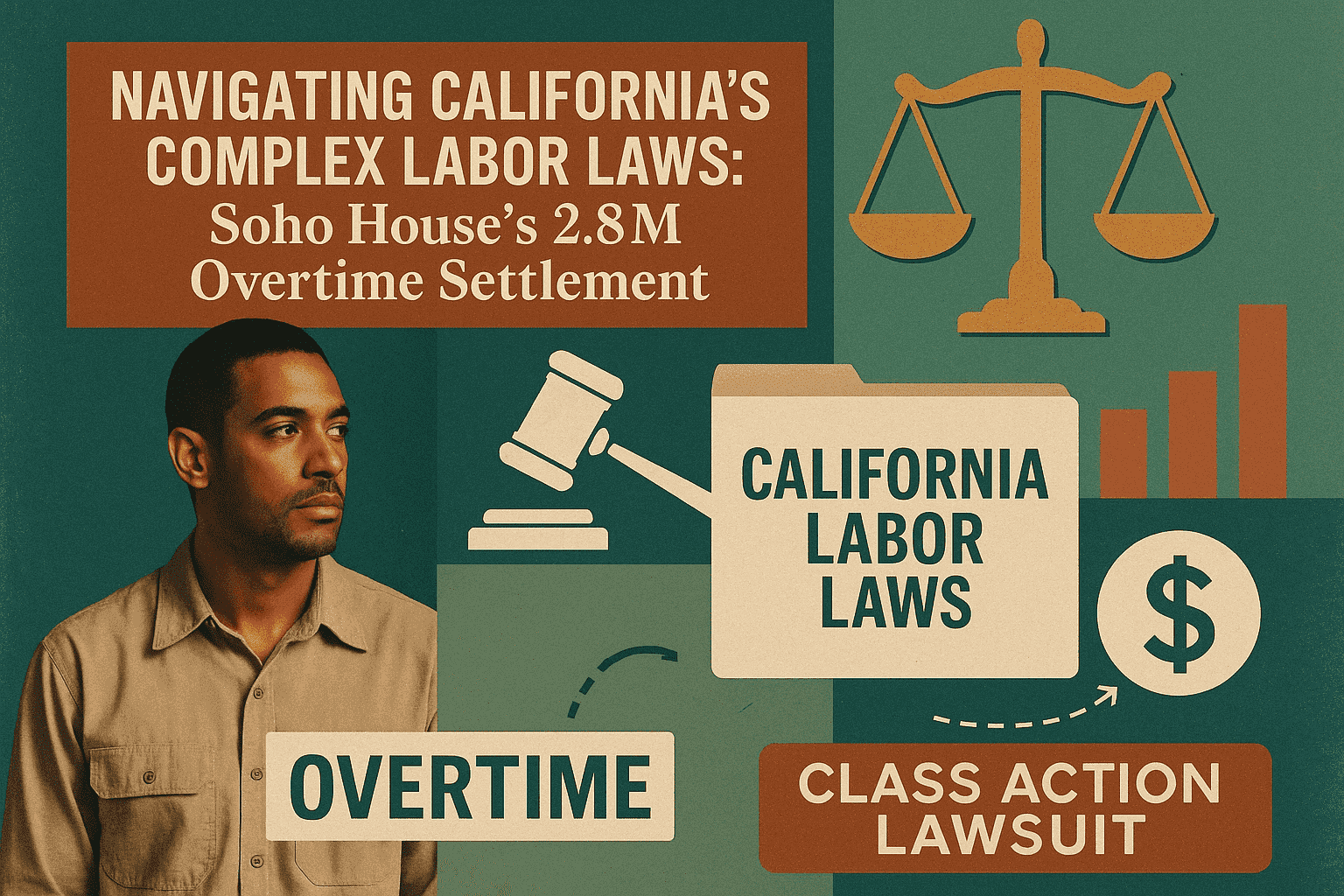Navigating California's Complex Labor Laws: Soho House's $2.8M Overtime Settlement
Explore how Soho House faced a $2.8 million settlement over unpaid overtime in California, highlighting the state's stringent labor laws and their impact on hospitality employers. Learn about the allegations and legal challenges involved in this high-profile case.

California's Costly Labor Landscape: A Deep Dive into Soho House's Overtime Class Action Exposure
A Soho House Insider Legal Editorial
California remains the most volatile legal jurisdiction for hospitality employers in North America, demanding meticulous adherence to complex wage-and-hour laws. For Soho House & Co Inc. (SHCO), the state's stringent labor codes have repeatedly translated into significant, multi-million dollar liabilities. The following analysis examines the outcomes and ongoing disputes centered on alleged underpaid overtime and core labor violations in the Los Angeles market.
Case Study I: The $2.8 Million Overtime Settlement
The most definitive financial liability stemming from California labor practices relates to a class action targeting the Los Angeles area location, SoHo House West Hollywood LLC.
The Allegations
The unpaid overtime class action lawsuit, originally filed in December 2012 by Andrea W. (Case No. BC496246 in the Superior Court of the State of California), involved allegations of systemic violation of California wage laws that impacted over 1,000 employees. The claims were extensive, striking at several core compliance areas:
- Unpaid Overtime and Off-the-Clock Work: Employees alleged the restaurant and club chain failed to pay overtime pay and that employees were not paid for work performed off the clock. California law requires nonexempt employees to receive one and a half times their regular rate of pay when working overtime.
- Missed Breaks [1]: Allegations included that employees missed meal periods or missed rest breaks because SoHo House failed to inform them of California wage laws requiring 10-minute breaks every four hours.
- Additional Compensation Failures [1]: Claims also included underpayment for unused personal days and a failure to provide proper reimbursement for the cost of maintaining their uniforms.
The Resolution [1]
The case concluded with a substantial resolution in January 2015. SoHo House agreed to pay $2.8 million in settlements to the Class Members who claimed the defendants broke California wage laws. While the company agreed to the settlement to avoid large amounts of time and money the lawsuit would cost, SoHo House continued to deny that they broke California overtime laws. As of the report date, 637 out of about 1,250 unpaid overtime claims had been collected. [1]
Case Study II: The Ongoing Rest and Wage Statement Litigation
A separate action, Correa and Vasquez v. Soho House Clubs, showcases the sophisticated defense strategies required to manage labor claims in California and the high financial stakes involved in failure to comply with meal and rest period requirements.
Claims and Financial Exposure
The plaintiffs, former non-exempt employees of Soho House Clubs (entities operating dining and drinking establishments in Los Angeles County), brought claims under the California Labor Code:
- Missed Rest Periods: Plaintiffs alleged they regularly worked shifts that lasted more than four hours without any rest periods.
- Wage Statement Penalties [2]: The company allegedly failed to pay premium wages on days when employees were entitled to, but unable to take, rest periods. As a result of these missed premiums, plaintiffs argued they were provided with inaccurate wage statements in violation of California Labor Code section 226(e)(1).
- Other Failures [2]: The complaint also cited a failure to pay the full amount due at the end of employment (waiting time penalties) and failure to reimburse work-related expenses.
The total financial [2] exposure of this class action was significant. The defense successfully argued that the total amount in controversy was $5,046,514, exceeding the $5,000,000 jurisdictional threshold required to maintain the case in federal court under the Class Action Fairness Act (CAFA).
The Failure of Arbitration [2]
In an attempt to manage the litigation privately, Soho House Clubs moved to compel individual arbitration based on the Dispute Resolution Agreement (DRA). However, the U.S. District Court denied the motion to compel arbitration. The ruling highlighted critical legal deficiencies in the documents presented by the defense:
- Incomplete Agreement: The Court found that the copies of the DRA submitted were incomplete and material portions of the plain language were missing or obscured.
- Undeterminable Scope: [2] Because sections like the "Claims Covered Under the DRA," the "Mutual Promise" regarding class action claims, and the "Severability" provision were incomplete or obscured, the Court could not determine the DRA's scope and enforceability.
This outcome exposed the entire claim [2] to public litigation rather than private arbitration, confirming that maintaining legally sound dispute resolution agreements is as vital to minimizing litigation risk as operational compliance itself. The two cases collectively underscore the systemic labor risk SHCO faces in the California market, covering everything from core overtime and break violations to procedural compliance failures.
References
Legal Disclaimer
The information in this article/post is provided for educational, commentary, and criticism purposes only, drawing from publicly available sources under fair use principles. No intentional effort has been made to infringe trademarks, cause confusion, or exploit Soho House's goodwill for commercial gain. This site is non-commercial and operated in good faith as an independent resource. If you believe any content is inaccurate, infringing, or otherwise disputed, please contact us via the contact form for prompt review and potential resolution. We are not affiliated with Soho House.